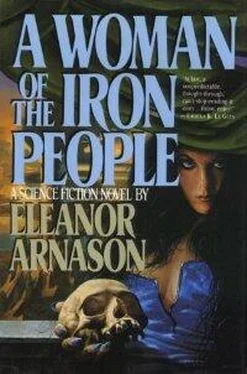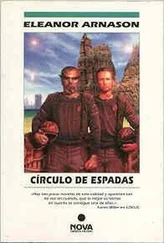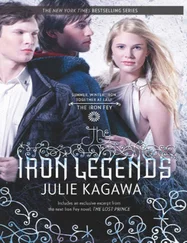“True enough,” said Eddie. “What we have is goddamned compromise. It isn’t going to hold. Once we are down here—”
Ivanova said, “For once I agree with Eddie. We have to be able to travel. We have come so far.” She paused. “Maybe we can find another people who will set fewer limitations.”
“Not tonight,” said Mr. Fang.
We reached the river. There were lights on one of the boats. Tatiana and Yunqi sat together on the deck. They helped Mr. Fang onboard. Ivanova and Eddie followed.
The oracle said, “I want to sleep. This has been a long day.”
“You’re right about that,” I said.
We took him to the other boat and got him bedded down in the cabin.
Derek and Agopian and I went out on deck. The river air was cool and full of bugs. They swarmed around the deck lights once we turned them on. Agopian and I sat down. Derek went and got beers.
We drank, not speaking. We could hear voices from the other boat: Ivanova and Eddie, describing what had happened to Tatiana and Yunqi.
Agopian said, “I don’t know how long that conversation will go on.”
“Hours, most likely.”
“Maybe.” He set down his bottle. “There is something I have to tell you.”
I looked at him. “Your secret. Your ethical complexity.”
“Yes.”
“Can’t it wait?”
“I’m not sure I’ll be able to get you alone. This is perfect now, if I have enough time.”
Derek said, “I’m willing to listen.”
Agopian looked at me.
I nodded.
“I’m going to try to tell this as quickly as possible. I don’t know when that conversation will end, and Tatiana will come over. There is information that has been kept hidden and lies that have been told. I think it’s time this situation was rectified.”
Derek leaned forward. “What kind of information?”
“History. What’s been happening on Earth during the past one hundred years.”
“We have the messages from Earth,” I said.
“They are lies.”
“You know this for certain?” asked Derek.
“I wrote them—with help, of course. It was too big a job for any one person.”
“Why?” I asked.
Derek asked, “When?”
“You know there was trouble coming into the system.”
Derek made the gesture of agreement.
Agopian looked puzzled and went on. “There was a lot more junk than we had expected, and a lot of it was a long way out. A kind of super Oort cloud. And there were problems with the astrogation system. The computers decided it was an emergency. They woke the crew up early. We brought the ship in.
“We didn’t have time to wake up any other people. But we did have time to check the messages that had been coming in from Earth. They were crazy.”
“What do you mean?” I asked.
“I mean exactly that. The messages are crazy. Earth has changed a lot.” He paused. “We thought history would stop because our lives had stopped, because we were sleeping a magic sleep like children in a fairy tale.
“Not true. History went on and took a turn…” He paused again. “Progress is not inevitable. That is an error the vulgar Marxists make. I’ve always liked that term. I imagine a man with a big thick beard, farting at the dinner table as he explains commodity fetishism or the labor theory of value. And of course he gets the theory wrong.”
“What are you talking about?” I asked.
“Progress. There is no law that says humanity has to evolve ever higher social forms. Collapse is possible. Regression or stagnation. That’s essentially what happened after the twentieth century. Not regression but stagnation. We thought it was a characteristic of post-capitalist societies: extreme stability, as opposed to the extreme instability of capitalism, the crazy rate of change during the nineteenth and twentieth centuries.
“I think now the stability came from the terrible mess created in the twentieth century, the lack of resources and precarious state of the environment. We spent two hundred years cleaning up—trying to return the planet to its former state, trying to undo what those creeps and epigones had done. We didn’t have time for innovation.”
“We built the L-5 colonies,” I said.
“And the ship,” said Derek.
“Those are new objects. I am talking about new ideas. Most of our ideology and technology comes—came—from the old society. Most of what we have done is based on what people already knew prior to the collapse.”
“That isn’t entirely true,” I said.
Agopian said, “It is mostly true. We have been like the people of the early Middle Ages. We used the old knowledge in new ways. But we did not add to it.”
Derek frowned. “I question that analogy.”
“I don’t want to argue about the Middle Ages.”
Derek made the gesture that meant “forget what I said.”
“In any case, the stability—or stagnation—was only temporary. That’s what we learned when we woke up and listened to the messages from home. About the time we left, the various societies on Earth began to change rapidly.”
He paused, frowning. “The changes were disturbing. We—I mean the crew—could barely handle the information we were getting, and we are—without a question—the most disciplined people on the ship. We had no idea what would happen if the rest of you woke up and heard. We imagined panic and a collapse of morale. Some people would want to run home, though home to what is a question. Others would fall apart. There would have been months of argument and a decline in the quality of work. It seemed to us that the expedition had to be protected. We took a vote—everyone who wasn’t frozen. We decided to change the messages.”
I opened my mouth.
He held up a hand. “Don’t ask questions. I don’t know how much time I have, and I want to tell you as much as possible.”
“Okay.”
“We started by changing history. That was comparatively easy. We drafted—I drafted—an alternative history, one we felt more comfortable with. After that it was a matter of searching and replacing. We told the computer system to look for certain kinds of events—and remove them and replace them with other kinds of events.”
He smiled. “I have to say, I have a new respect for liars, especially those who lived before computers. I have no idea how you can manage to rewrite history without a computer.”
“Why did you do it?” I asked. “What could possibly be so terrible about the messages from Earth?”
He sat next to one of the deck lights. I could see him clearly: a rectangular face, pale brown in color. His eyes were large and dark. His nose was high and narrow, with a slight curve. His mouth was ordinary. It was the eyes that dominated the face and the unruly curly hair, worn slightly longer than was fashionable among members of the crew.
“There are three things that matter to me: socialism, Marxism, and the Soviet Union. I don’t think that what I feel is chauvinism. It’s love for a place and pride in what the people there have done. How they fought again and again, generation after generation, to build a society that really embodied the principles of socialism. They succeeded, though just barely. The revolution was not destroyed by Stalinism or Fascism or nationalism or even by the many crimes and the amazing stupidity of the apparatchiks. The people managed finally to create a society that was decent and just.”
“If it makes you feel better, we’ll tell you that your feeling is not chauvinism,” Derek said.
Agopian smiled. “My life has been built around socialism and Marxism and the Soviet Union. They are like coordinates. They give me a place in space and time. They give me a framework: moral, intellectual, historical, social, and personal.
Читать дальше












